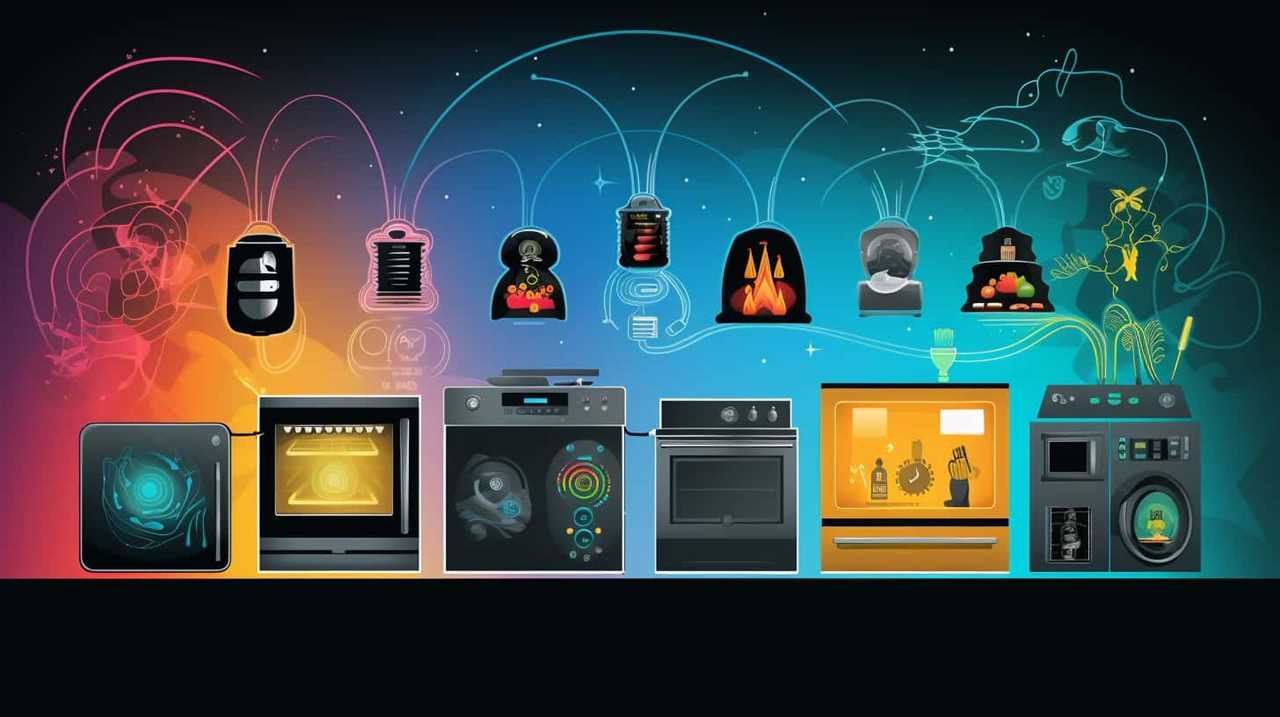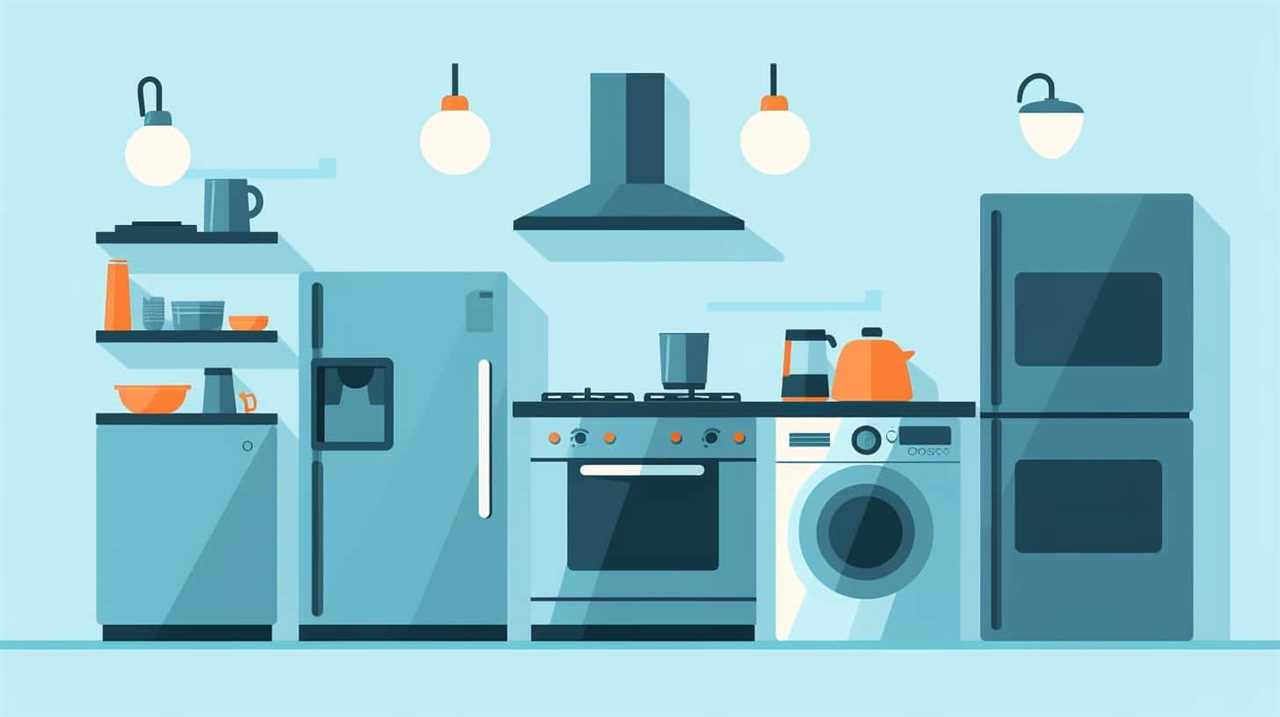Gas appliances are now a crucial component of contemporary homes, offering effective and dependable performance.
In this comprehensive guide, we will explore a variety of appliances that utilize gas as their primary source of energy. From stoves and ovens to water heaters and dryers, these appliances offer exceptional performance and convenience.
Additionally, gas furnaces efficiently heat our homes, while gas fireplaces create a cozy ambiance. Outdoor enthusiasts can also enjoy the benefits of gas with grills and generators that deliver exceptional cooking and power backup capabilities.
As we delve into the realm of gas appliances, we will provide a thorough understanding of their features, benefits, and maintenance requirements.

Whether you are a homeowner or an aspiring expert seeking mastery, this guide will equip you with the knowledge needed to make informed decisions about gas appliances.
Key Takeaways
- Gas stoves, ovens, and water heaters provide instant heat, precise temperature control, and faster cooking compared to electric appliances.
- Gas heaters, including furnaces and fireplaces, have high efficiency and lower energy bills, but require regular maintenance, proper ventilation, and appropriate sizing for safe operation.
- Gas dryers are efficient, cost-effective, and durable, with faster drying times, lower operating costs, and lower environmental impact compared to electric dryers.
- Safety considerations for gas appliances include installing carbon monoxide detectors, ensuring proper ventilation, regularly inspecting for damage or wear, and scheduling annual professional maintenance.
Stoves and Ovens
There are two main types of gas appliances commonly found in kitchens: gas stoves and gas ovens.
Gas stoves are known for their efficiency, as they provide instant heat and precise temperature control. Compared to electric stoves, gas stoves heat up faster and allow for more even cooking. Additionally, gas stoves are more energy-efficient, making them a popular choice for those looking to reduce their energy consumption.
On the other hand, gas ovens require special safety considerations. It is important to ensure proper ventilation to prevent the buildup of carbon monoxide, a colorless and odorless gas that can be harmful if inhaled. Regular maintenance and inspections are necessary to ensure the safety of gas ovens.

Transitioning to the subsequent section about ‘water heaters’, gas appliances play a significant role in providing essential services in our homes.
Water Heaters
Water heaters are an important appliance in many households, and it is worth considering the benefits of using a gas water heater.
One key advantage is their efficiency, as gas water heaters tend to heat water more quickly and efficiently compared to electric water heaters.
Safety is also a crucial consideration, and it is important to be aware of the proper installation and maintenance requirements for gas water heaters.

Additionally, it is helpful to compare the cost of using a gas water heater versus an electric one, as gas water heaters often have lower operating costs in the long run.
Efficiency of Gas Heaters
Gas heaters, particularly water heaters, demonstrate high efficiency due to their ability to quickly and effectively heat water using natural gas as a fuel source. Compared to electric heaters, gas heaters are more cost-effective in terms of energy consumption.
Gas heaters have a higher energy efficiency rating, typically around 80-90%, while electric heaters often operate at around 95-98% efficiency. This means that gas heaters convert a larger percentage of the fuel into usable heat, resulting in lower energy costs.
Additionally, gas heaters have a faster recovery rate, allowing them to heat water more quickly and efficiently. Despite the initial higher cost of installation, gas heaters offer long-term savings and are a preferred option for homeowners looking to maximize energy efficiency and reduce utility expenses.

Safety Considerations for Gas Water Heaters
When considering the safety of gas water heaters, it is essential to be mindful of potential hazards and take appropriate precautions. Here are some important safety precautions and maintenance tips to keep in mind:
- Install a carbon monoxide detector near the water heater to alert you in case of a gas leak.
- Ensure proper ventilation by keeping the area around the water heater clear of debris and obstructions.
- Regularly inspect the water heater for signs of damage or wear, such as rust, leaks, or loose connections.
- Follow the manufacturer’s instructions for lighting and extinguishing the pilot light to prevent accidents.
- Schedule annual professional maintenance to check for any potential issues and ensure the safe operation of the water heater.
By following these safety precautions and maintenance tips, you can enjoy the benefits of a gas water heater while minimizing the risks.
Now, let’s move on to the next section to compare the cost of gas water heaters with electric ones.
Cost Comparison With Electric
To compare the cost of gas water heaters with electric ones, it is important to consider the financial implications.

Gas water heaters typically have a higher upfront cost compared to electric models. However, they are generally more energy-efficient and have lower energy consumption, resulting in lower monthly utility bills.
Gas water heaters also tend to have a longer lifespan, reducing maintenance and replacement costs over time.
On the other hand, electric water heaters have a lower upfront cost but generally have higher energy consumption, leading to higher utility bills. Additionally, electric water heaters have a higher environmental impact due to the reliance on electricity generated from fossil fuels.
Overall, while gas water heaters may have a higher initial cost, their energy efficiency and lower environmental impact make them a cost-effective and environmentally friendly choice in the long run.

In the subsequent section about ‘dryers’, we will explore the cost comparison between gas and electric dryers.
Dryers
Gas dryers are known for their efficiency and cost-effectiveness compared to electric dryers. They typically dry clothes faster, thanks to their higher heat output, which can save both time and energy.
Additionally, gas dryers tend to have lower operating costs, making them a popular choice for many households.
Efficiency of Gas Dryers
Gas dryers are known for their high efficiency. They offer several benefits, including cost savings and a reduced environmental impact. Here are five reasons why gas dryers are an efficient choice:

- Faster drying time: Gas dryers heat up faster than electric dryers, allowing for quicker drying cycles.
- Lower operating costs: Gas is typically cheaper than electricity, resulting in lower energy bills and long-term cost savings.
- Energy efficiency: Gas dryers use less energy compared to electric dryers, reducing their environmental impact.
- Better drying performance: Gas dryers can reach higher temperatures, resulting in better drying performance and fewer wrinkles.
- Durability: Gas dryers are built to last, with sturdy construction and high-quality components that ensure long-term reliability.
Cost Comparison With Electric
When comparing costs, gas dryers outperform their electric counterparts. Gas dryers offer several cost benefits over electric dryers. Firstly, gas is generally cheaper than electricity, resulting in lower operating costs for gas dryers. Additionally, gas dryers tend to have shorter drying times, which further reduces energy consumption and saves money in the long run. Moreover, gas dryers are also more durable and require less maintenance compared to electric dryers, contributing to additional cost savings.
In terms of environmental impact, gas dryers produce fewer greenhouse gas emissions compared to their electric counterparts, making them a more environmentally friendly option. Overall, gas dryers provide significant cost benefits and have a lower environmental impact compared to electric dryers.
Transition to the subsequent section about furnaces:
Similarly, when considering home heating options, gas furnaces also offer cost benefits and environmental advantages over electric furnaces.

Furnaces
Furnaces are commonly fueled by natural gas or propane. Here are some key considerations regarding gas furnaces:
- Efficiency: Gas furnaces are known for their high efficiency, with some models boasting up to 98% efficiency. This means that less energy is wasted, resulting in lower energy bills.
- Safety: Safety is paramount when it comes to gas furnaces. Regular maintenance and inspections are essential to ensure proper functioning and to prevent carbon monoxide leaks. It is important to have a working carbon monoxide detector in the house.
- Ventilation: Proper ventilation is crucial for gas furnaces to operate safely. A well-designed and maintained ventilation system helps to remove combustion byproducts and ensures fresh air supply.
- Size: The size of the furnace should be appropriate for the space it is intended to heat. A professional assessment can determine the right size to ensure optimal efficiency and comfort.
- Lifespan: On average, gas furnaces have a lifespan of 15 to 20 years. Regular maintenance and prompt repairs can extend the lifespan and ensure consistent performance.
Fireplaces
Fireplaces can be fueled by natural gas or propane, providing a cozy and inviting ambiance in homes. Gas fireplaces have gained popularity due to their convenience and efficiency. They offer several benefits over traditional wood-burning fireplaces, including lower maintenance requirements and improved energy efficiency.
Here are some key benefits of gas fireplaces:
| Benefits | Description |
|---|---|
| Low maintenance | Gas fireplaces require minimal maintenance compared to wood-burning ones. |
| Clean and convenient | There is no need to gather and store firewood, and no ash or soot to clean. |
| Energy efficient | Gas fireplaces provide heat without the energy loss associated with chimneys. |
To ensure optimal performance, regular fireplace maintenance is necessary. This includes cleaning the glass and interior components, inspecting and cleaning the burner, and checking for any gas leaks. Professional maintenance is recommended to ensure safe and efficient operation.

Transition: Now that we have explored the benefits of gas fireplaces, let’s move on to discussing another gas appliance commonly found in outdoor spaces: grills.
Grills
Grills, a popular gas appliance commonly found in outdoor spaces, offer a convenient and efficient way to cook food. Whether you’re grilling burgers, steaks, or vegetables, mastering grill maintenance and employing proper grilling techniques can enhance your culinary skills. Here are five essential tips to help you become a grill master:
- Clean the grill grates before and after each use to prevent food buildup and ensure even heat distribution.
- Regularly inspect the propane tank for leaks and make sure the gas lines are securely connected.
- Preheat the grill for at least 10-15 minutes to ensure the grates are hot and ready for cooking.
- Use direct heat for quick-cooking foods like burgers and steaks, and indirect heat for slower cooking or delicate items like fish or vegetables.
- Invest in a good quality meat thermometer to accurately gauge the doneness of your grilled meats.
Generators
Gas generators provide a reliable source of backup power during emergencies or when there is a lack of electricity. To ensure their optimal performance and longevity, regular generator maintenance is essential. This includes routine oil and filter changes, spark plug inspections, and cleaning or replacing air filters. Additionally, it is crucial to inspect and tighten all electrical connections, as loose connections can lead to power outages or damage to the generator.
When comparing gas generators to diesel generators, several factors come into play. Gas generators are generally more affordable and easier to operate, while diesel generators are known for their durability and fuel efficiency. Gas generators are quieter and emit fewer emissions, making them suitable for residential use. On the other hand, diesel generators are often preferred for industrial or commercial applications due to their ability to handle heavy loads and provide continuous power for extended periods.

Ultimately, the choice between a gas generator and a diesel generator depends on specific power needs and usage requirements.
Frequently Asked Questions
Are There Any Safety Precautions to Keep in Mind When Using Gas Appliances?
Gas appliances provide convenience and efficiency in homes and workplaces. However, it is crucial to observe safety precautions when using them. Regular maintenance, proper ventilation, and carbon monoxide detectors are essential for ensuring the safe operation of gas appliances.
Can Gas Appliances Be Converted to Run on Electricity?
Gas appliances can be converted to run on electricity, offering several benefits such as increased energy efficiency and reduced carbon emissions. However, it is important to consult with a professional to ensure proper installation and compatibility with electrical systems.
What Are the Advantages of Using Gas Appliances Over Electric Appliances?
Gas appliances offer several advantages over electric appliances, including higher energy efficiency, faster heating and cooking times, and lower operating costs. They are also more reliable during power outages and provide a consistent heat source for improved cooking and baking.

Are There Any Government Regulations or Requirements for Installing Gas Appliances?
Government regulations and installation requirements for gas appliances vary by jurisdiction. These regulations ensure the safe installation and operation of gas appliances, addressing factors such as ventilation, gas line sizing, and proper connections, to safeguard both the users and the environment.
How Often Should Gas Appliances Be Inspected or Maintained for Optimal Performance and Safety?
To ensure optimal performance and safety, gas appliances should be inspected and maintained regularly. The frequency of inspections depends on the specific appliance and manufacturer guidelines. Safety precautions should be followed during inspections to minimize risks and ensure compliance with regulations.
Conclusion
In conclusion, gas appliances such as stoves, ovens, water heaters, dryers, furnaces, fireplaces, grills, and generators play a significant role in our daily lives. Their efficiency and convenience make them popular choices for many households.
However, it is important to ensure proper maintenance and safety precautions when using these appliances. Remember, gas appliances bring warmth and comfort to our homes, but always prioritize safety to avoid any unexpected sparks that may ignite a flame.










